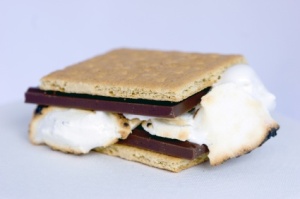
Do you want more self-control? Or less of it? I can’t decide.
I got thinking about delayed gratification thanks to a recent New Yorker article titled Don’t! The Secret of Self Control. It’s all about the marshmallow experiment that was done back in the ’60s.
Give 4-year-olds a marshmallow; tell them not to eat it for 15 minutes; reward them with a second marshmallow if they’re successful. The guy who wrote the study followed up with the subjects as adults. He discovered that the kids who were able to delay their gratification also scored higher on the SATs, earned higher salaries, and were more conventionally successful than the subjects who ate the first marshmallow.
The article concluded: Self-control is more important than IQ in helping people lead successful lives.
Outsmarting Desire
Throughout the article I was more-or-less on board with this whole “self control” thing. But then I read the following paragraph:
…even the most mundane routines of childhood — such as not snacking before dinner, or saving up your allowance, or holding out until Christmas morning — are really sly exercises in cognitive training: we’re teaching ourselves how to think so that we can outsmart our desires. (Don’t! The Secret of Self Control p. 32).
Really? Is that the goal?! I’m all for cognitive training. And there’s certainly value in learning how to wait for what I want. But — outsmart desire?
Why Would I Want To Do That?
On one level, I get it. It’s important to learn how to control my desires, rather than letting them control me.
Last week I made the unusual choice to wait to eat the Ben & Jerry’s icecream until after I folded the laundry, as a reward. Usually I do it the other way around…but then never end up folding the laundry!
The reason the phrase “outsmart desire” stopped me in my tracks is this: it suggests that “desire” and “smartness” are diametrically opposed. Desire happens in the body. Smartness happens in the brain. Conclusion: The brain needs to control the body.
This is a dangerous assumption. The body has so much wisdom. Desire is a teacher, not an unwelcome visitor who needs to be controlled. And besides, there really is no such thing as a body that is separate from brain. We’re really one, big, holistic system.
Being in Relationship With Desire
I’m left with this. I do want more self-control. So that I can have more of what I desire, not less. So I can be strategic about how I prioritize my many desires.
Yes, I want to eat all the ice cream right now! But I also value clean, unwrinkled clothes that are organized in my dresser drawer. Fold laundry first. Eat icecream second. All my needs get met.
Yes, I’d prefer to dive right into writing another blog entry. Writing’s fun! But I also desire to have a heathy body — and buying health insurance will help with that. (Not to mention, having health insurance meets my needs for security). Maybe I can send off an email to the insurance agent first, and then write for half an hour.
It’s less about control. And more about an ongoing relationship with myself and my desires.
Or perhaps I’m trying to out-desire my smarts! That’s a curious thought to ponder.

My friend Connie just posted this comment on Facebook, which I’d like to share with others. I appreciate the twist on what “outsmarting desire” might mean:
“Yes! We want our desires to be met, not “outsmarted”. Perhaps part of the problem is identifying the desire. Sometimes when I think the desire is chocolate ice cream, it’s really sleep, or love, or sometimes a glass of water! So if I eat ice cream right away without thinking about it, I do “outsmart” my desire!”